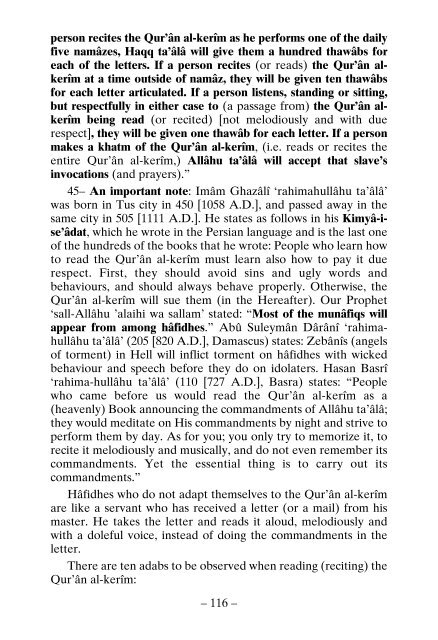O Son !
THE BOOK ‘O SON’ Al-hamdu lillâhi Rabbil ’âlamîn. Wa-s-salâtu wa-s-salâmu ’alâ Rasûlinâ Muhammadin wa Âlihi wa Sahbihi ajma’în. 1– O son! Collecting from books written by the scholars of the Hanafî Madhhab three hundred and sixty hadîth-i-sherîfs and forty-four khabars and also the seven essentials and the five rukns and the seven wâjibs and the fourteen sunnats and the twenty-five mustahabs and the fourteen mufsids of namâz, I have explained them for you. Adapt your acts and deeds to these teachings so that you attain fayz and nejât (salvation)! 2– Also for your information, I have collected a thousand and ninety âdâb (adabs) for you and for other young Muslims like you. If you adapt your actions and acts of worship to these teachings, they will be sufficient for you. If you laze, disobey Allâhu ta’âlâ and cease from these practices and manners, you will be afflicted with slavery and disgrace in the world and subjected to torment in the world to come. If you live up to them and advise your Muslim brothers to do the same, it will be useful for you. They will say blessings over you. And Haqq ta’âlâ will accept their invocations. For, a slave will be pardoned on account of another slave’s invocations for them.
THE BOOK ‘O SON’
Al-hamdu lillâhi Rabbil ’âlamîn. Wa-s-salâtu wa-s-salâmu ’alâ
Rasûlinâ Muhammadin wa Âlihi wa Sahbihi ajma’în.
1– O son! Collecting from books written by the scholars of the
Hanafî Madhhab three hundred and sixty hadîth-i-sherîfs and
forty-four khabars and also the seven essentials and the five rukns
and the seven wâjibs and the fourteen sunnats and the twenty-five
mustahabs and the fourteen mufsids of namâz, I have explained
them for you. Adapt your acts and deeds to these teachings so that
you attain fayz and nejât (salvation)!
2– Also for your information, I have collected a thousand and
ninety âdâb (adabs) for you and for other young Muslims like you.
If you adapt your actions and acts of worship to these teachings,
they will be sufficient for you. If you laze, disobey Allâhu ta’âlâ
and cease from these practices and manners, you will be afflicted
with slavery and disgrace in the world and subjected to torment in
the world to come.
If you live up to them and advise your Muslim brothers to do
the same, it will be useful for you. They will say blessings over you.
And Haqq ta’âlâ will accept their invocations. For, a slave will be
pardoned on account of another slave’s invocations for them.
You also want an ePaper? Increase the reach of your titles
YUMPU automatically turns print PDFs into web optimized ePapers that Google loves.
person recites the Qur’ân al-kerîm as he performs one of the daily<br />
five namâzes, Haqq ta’âlâ will give them a hundred thawâbs for<br />
each of the letters. If a person recites (or reads) the Qur’ân alkerîm<br />
at a time outside of namâz, they will be given ten thawâbs<br />
for each letter articulated. If a person listens, standing or sitting,<br />
but respectfully in either case to (a passage from) the Qur’ân alkerîm<br />
being read (or recited) [not melodiously and with due<br />
respect], they will be given one thawâb for each letter. If a person<br />
makes a khatm of the Qur’ân al-kerîm, (i.e. reads or recites the<br />
entire Qur’ân al-kerîm,) Allâhu ta’âlâ will accept that slave’s<br />
invocations (and prayers).”<br />
45– An important note: Imâm Ghazâlî ‘rahimahullâhu ta’âlâ’<br />
was born in Tus city in 450 [1058 A.D.], and passed away in the<br />
same city in 505 [1111 A.D.]. He states as follows in his Kimyâ-ise’âdat,<br />
which he wrote in the Persian language and is the last one<br />
of the hundreds of the books that he wrote: People who learn how<br />
to read the Qur’ân al-kerîm must learn also how to pay it due<br />
respect. First, they should avoid sins and ugly words and<br />
behaviours, and should always behave properly. Otherwise, the<br />
Qur’ân al-kerîm will sue them (in the Hereafter). Our Prophet<br />
‘sall-Allâhu ’alaihi wa sallam’ stated: “Most of the munâfiqs will<br />
appear from among hâfidhes.” Abû Suleymân Dârânî ‘rahimahullâhu<br />
ta’âlâ’ (205 [820 A.D.], Damascus) states: Zebânîs (angels<br />
of torment) in Hell will inflict torment on hâfidhes with wicked<br />
behaviour and speech before they do on idolaters. Hasan Basrî<br />
‘rahima-hullâhu ta’âlâ’ (110 [727 A.D.], Basra) states: “People<br />
who came before us would read the Qur’ân al-kerîm as a<br />
(heavenly) Book announcing the commandments of Allâhu ta’âlâ;<br />
they would meditate on His commandments by night and strive to<br />
perform them by day. As for you; you only try to memorize it, to<br />
recite it melodiously and musically, and do not even remember its<br />
commandments. Yet the essential thing is to carry out its<br />
commandments.”<br />
Hâfidhes who do not adapt themselves to the Qur’ân al-kerîm<br />
are like a servant who has received a letter (or a mail) from his<br />
master. He takes the letter and reads it aloud, melodiously and<br />
with a doleful voice, instead of doing the commandments in the<br />
letter.<br />
There are ten adabs to be observed when reading (reciting) the<br />
Qur’ân al-kerîm:<br />
– 116 –

















